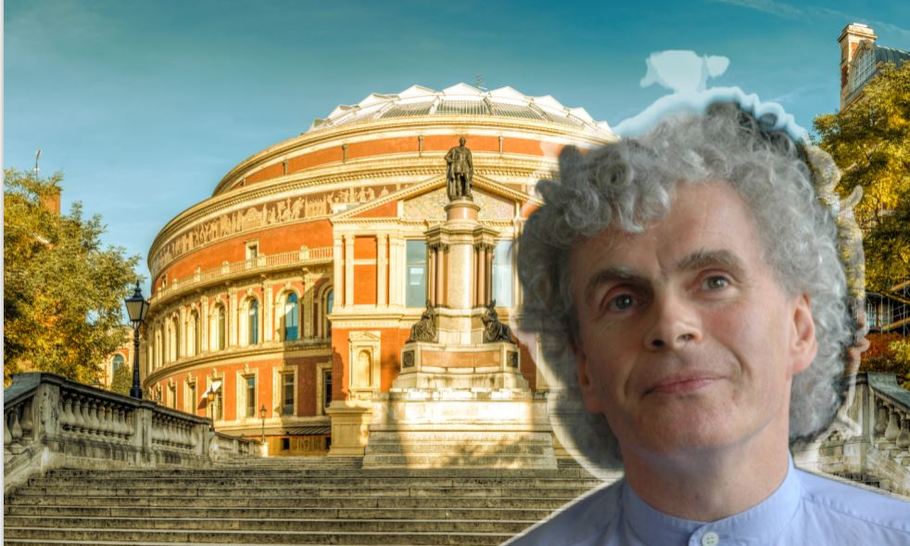Paradise at the Proms: Rattle’s role in British music

Sir Simon Rattle and The Royal Albert Hall, venue for The BBC Proms (image created in Shutterstock)
There were an outrageously large number of unfilled seats at the Royal Albert Hall last night for Sir Simon Rattle’s penultimate concert with the London Symphony Orchestra. “Well, they’re all just philistines,” said one elderly Prommer to me. I had expressed exasperation at the lack of enthusiasm for what was, if nothing else, one of the most revealing Proms of this year’s season.
The reason for the gaps must have been the music on offer. Robert Schumann’s Das Paradies und die Peri is undoubtedly a strange piece, written by quite a strange man. It has languished in the repertory, despite its ubiquitous place among the composer’s output during his lifetime.
This is due to two factors. Firstly, the plot and libretto — which tell of a female “peri”, or fairy, who tries in three attempts to gain entry to paradise through various gifts, eventually succeeding with the gift of the tears of a criminal watching a boy at prayer — are quite simply a load of hyper-Romantic esoteric nonsense; the various obscure references and clunky syntax seem to be almost a parody.
The piece shares some similarities with the large choral works of Berlioz, and both seem to have suffered from the twentieth century’s obsession with the purely high-minded and more objective. Essentially, you had to wait for Wagner until you get to the stuff high-minded enough for the audiences of forty years ago, until conductors like Rattle, Sir John Eliot Gardiner and the late Sir Colin Davis came to save the day.
Secondly, this piece was imagined by Schumann as the first of a new genre, awkwardly posing somewhere between an opera and oratorio, with a large group of soloists with highly individual parts. In short, it’s pricey to put on, and, since it faded out of popular memory for the best part of two centuries, no one has dared.
Well, Simon Rattle has spent quite a large part of his magnificent career in daring musical pursuits. The City of Birmingham Symphony Orchestra shocked most of conservative Britain with their sell-out performances of Messiaen and Stravinsky in the 1980s, and he has always had a love for Schumann’s Paradies. On show on Tuesday night were all the usual trappings of a fine Rattle performance: the attention to detail, the clear and nuanced choice of orchestral colours, the insistence on strict time, the beautifully musical sense of rubato. The LSO are a force to behold under his directions, and probably under the baton of most. Whether Sir Tony Pappano will be able to draw out the same level of detail is another question.
The Orchestra’s string sound was the most impressive of the evening, drawing out every sinew from Schumann’s deliciously Romantic lines. It is for his orchestration that the composer is often criticised in his larger works. Big moments such as the ending don’t quite have the panache of, say, Berlioz’s finales. Yet they were given every due by the supreme playing of the LSO. That we have one of the finest bands in the world so regularly promoting new music is a cultural highlight of Britain today. Why it gets so little praise is beyond me, and has something to do with why Rattle is off back to Germany next year.
Despite some minor qualms and its awful texts, Paradies is a truly wonderful piece of music. Many of the solo duets seem to foreshadow the best moments of Tchaikovsky’s operatic writing in their joyous momentum, and the highlights bring out Schumann’s musical irony, famously present in his songs. It is a fantastically varied score, with plenty of choral power kept in reserve for requisite moments; and they were given all the verve one could expect by the excellent Chorus.
The soloists were superb. Being Simon Rattle gives you pretty good scope to get the best of the bunch and to keep them, and soprano Lucy Crowe, tenor Linard Vrielink and baritone Florian Boesch were standout performers in a stellar cast of voices. Attention to detail, exquisite tone and an evident commitment are hallmarks of Rattle’s performances. All those qualities come from the people he gets to sing for him too.
And Rattle’s conducting is still the unique force it has always been. In giving the cues to the Chorus, the energy and sheer vitality of his baton is never in question, just as his delicacy and expressivity is almost unparalleled. Rattle signs off from a full-time position in London with Mahler’s 9th on Sunday. It promises to be a grand farewell from the man who has done more to revitalise and bring life to British classical music than anyone else in the last forty years. Performances like last night’s show just what that spirit of restless discovery can do.
A Message from TheArticle
We are the only publication that’s committed to covering every angle. We have an important contribution to make, one that’s needed now more than ever, and we need your help to continue publishing throughout these hard economic times. So please, make a donation.




